Regenerative Hemp Farming in South Africa
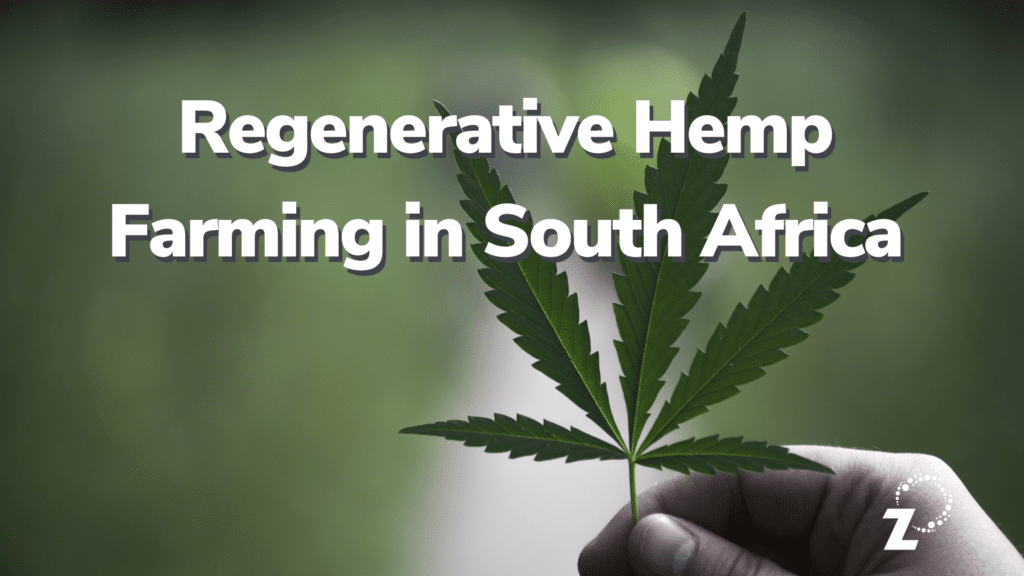
Over 20 years ago, the South African government began investigating the viability of hemp farming in South Africa. Today, South Africa is still importing hemp products from other countries, largely because the country needs a sustainable, legalised system of production. So, where are we now when it comes to cultivating hemp products in South Africa?
What is hemp?
Hemp is a plant species in the Cannabis genus, which is indigenous to Central and upper South Asia. The plant is mainly cultivated for its fibre and seed.
Hemp products in South Africa
Products that can be made from hemp include food, clothing, rope, nappies, canvas, biodegradable plastics, fuels, chain lubricants, paper, cosmetics, cement blocks, soap… the list goes on. It can also be used to create hempcrete, a biocomposite material used in construction.
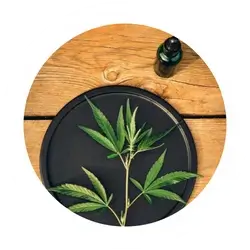
What is the difference between hemp and marijuana?

Marijuana is also a species of the Cannabis genus. While hemp and marijuana plants look similar, the marijuana plant is bushier than hemp. Both plants contain hundreds of plant compounds, including:
- THC, which has psycho-activity qualities
- Cannabidiol (CBD), which has anti-anxiety qualities
However, hemp has 0.2% or less THC. This means that hemp-derived products don’t contain enough THC to create the “high” associated with marijuana.
In addition, the marijuana plant has low fibre content and is not suitable for fibre production.
The state of hemp and cannabis farming in South Africa
South Africa released a National Cannabis Master Plan in 2021. This document highlights how the formal cannabis industry would be a boon for the country’s economy by integrating small growers into formal cannabis value chains and addressing licensing, technical and financial support. In his 2022 State of the Nation Address (SONA), President Cyril Ramaphosa said that the sector has the potential to create more than 130,000 new jobs. In the 2023 SONA, President Cyril Ramaphosa reiterated government’s commitment made in 2022 to unlock investment in the hemp and cannabis sector.
But despite promises of creating a fully-fledged cannabis and hemp industry in South Africa, the slow pace of legislative progress has resulted in several licensing and funding hurdles for businesses seeking to enter the hemp market legally.
In March 2024, these challenges were outlined by emerging businesses and the South African Health Product Regulatory Authority (SAHPRA) in a presentation to parliament‘s Portfolio Committee on Small Business Development.
Parliament’s response: “The committee welcomed SAHPRA’s recommendation that the government should take action to allow optimal participation by small growers. This includes expunging criminal records associated with illegal possession and trading of cannabis and hemp, bringing the industry into the mainstream economy, and protecting localisation for the small growers.”
The promise of the regenerative hemp industry in South Africa
With willing and knowledgeable farmers, drought-resistant acclimatised genetic strains of the plant, the perfect climate and demand for the product, South Africa certainly has the means to create a successful hemp industry.
With more than 25,000 industrial applications, hemp farming could unlock an industry with a potential value of R27 billion annually and create thousands of jobs. In addition to the economic benefits, hemp also lends itself to regenerative farming: the plant is able to sequester carbon, it needs less water than many other plants, and it can be grown largely without herbicides and pesticides.
Is it legal to grow hemp in South Africa?
Both private use and private cultivation of cannabis was decriminalised by a Constitutional Court judgment in September 2018. In May 2020, the government redefined industrial hemp with a 0.2% tetrahydrocannabinol (THC) guideline and are now taking the next steps to make regenerative hemp farming in South Africa a possibility.
On 29 October 2021, South Africa’s Minister of Agriculture, Land Reform and Rural Development, Ms Thoko Didiza, announced the opening of the application process for hemp permits. This followed the declaration of hemp as an agricultural crop under the Plant Improvement Act, no.53 of 1976. With hemp declared as an agricultural crop, the importation, exportation, cultivation, sale and research of hemp in South Africa is now permitted. However, the commercial use of marijuana remains prohibited in terms of the Drugs & Drug Trafficking Act 140 of 1992.
In 2023, 664 hemp and cannabis farmers in KwaZulu-Natal Agriculture received permits which grants them authorisation to cultivate, store and transport content with THC levels of not more than 0.2%.
How to apply for a hemp permit in South Africa?
Interested growers, researchers, processors and manufacturers can access hemp permit application forms, guidelines, requirements and guidelines on the department’s website: www.dalrrd.gov.za.
The regenerative potential of hemp farming
Regenerative farming refers to a system of farming principles and practices that regenerate soils by restoring the carbon cycle, the water cycle and the nutrient cycle. It produces nutrient-dense foods and high-quality agricultural products while restoring the soil’s other crucial ecosystem services.
Hemp fits well into the regenerative farming model. It is one of the easier plants to farm regeneratively, and it has its own regenerative properties. Even though it is an alien plant to South Africa, it is an annual plant and therefore can’t be truly invasive.
Hemp and carbon capture
Carbon capture and minimisation are central to mitigating the world’s climate crisis. Hemp roots can drive six times deeper than some tree roots, which essentially means six times more potential to drive carbon into the earth. Cannabis sequesters up to 10,000 tons of carbon per hectare.
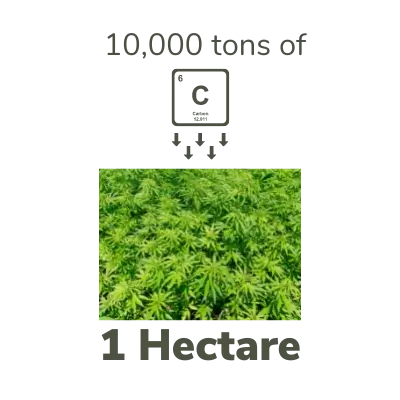
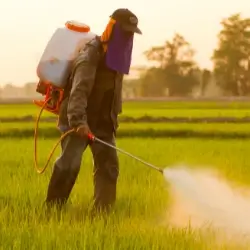
Fewer pesticides and herbicides
Hemp farmed in South Africa doesn’t require as many carbon-emitting and environmentally-damaging herbicides or pesticides as many other crops.
Regenerative soil health
Hemp’s deep roots aerate the soil, which means that it works well as a rotational crop, soil rehabilitator and prevents soil erosion. Traditional agriculture uses nitrogen, which adds to global warming. By sequestering carbon in the soil with regenerative farming practices and plants such as hemp, farmers also keep fungi and bacteria in the soil, which helps to remediate the damage done by conventional crop-protection chemicals. Using hemp as a rotational crop helps move agricultural systems to a polyculture farming approach and a meaningful change towards regenerative agriculture.
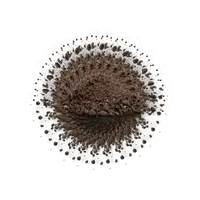
Environmentally-friendly hemp products
Hemp is a very versatile plant. Globally, hemp has a long history as one of the drivers of early industrialisation. The plant provided fibre for ropes and canvas for sails that powered maritime trade and helped to build the global market. It also provided textiles for clothing and played an important role in medicinal apothecaries.
Fibres
As a fabric, hemp is three times stronger than cotton and lasts longer. It’s also a hollow fibre, which makes it breathable and anti-bacterial. According to The Environmental Price of Fast Fashion, hemp has the least environmental impact among common fibres: cotton, polyester, non-cotton cellulosics, polyamide and wool.
Seed
Hemp seeds can be processed into a high-protein food. Both hemp hearts and protein powder made from crushing the seed shell are extremely high in proteins and omega essential fatty acids. The seed can also be cold-pressed into consumable oil. The seed has the potential to improve the diet of SA’s poor, resulting in improved health and boosted immune systems.
Bio-fuel and plastic
The hemp plant can be processed for fuel through a pyrolysis process or converted into ethanol by a fermentation process, producing both ethanol and biofuel. This fuel could potentially feed directly into the energy and plastic sectors. Eco-friendly bio-plastics produced from hemp could help to start reversing land and sea plastic pollution.
Building
The inner part of the hemp stalk is called the hurd. The hurd can be processed into “hempcrete”, a strong, fire-proof, moisture-proof, durable material that can be used for building. It can also be processed into eco-friendly insulation and pressed fibre-board.
Textiles
The outer part of the hemp stalk, known as the bast fibres, provides one of the longest fibres known to humanity. It is extremely versatile and can be used for an extensive range of consumer and industrial textiles, such as shoes, home furnishings, furniture and accessories.
Paper
Paper can be made from either the hurd or bast fibre. Industrial hemp paper is an alternative to conventional paper made from trees, providing a more renewable source for the world’s paper needs.
It takes hemp stalks just four months to grow, whereas trees take at least 20 years. This means that over a 20-year cycle, just one acre of hemp can produce as much paper as four to 10 acres of trees.
Medicine
Until the 1920s, cannabis medicines were the most commonly used medicines in the world. These days, medical cannabis is playing an increasing role in offering healthcare solutions for a variety of ailments.
Harnessing a previously illegal industry
The World Health Organisation estimates that South Africa is the third-largest illegal cannabis producer in the world. With proper certification and hemp permits in place, this puts the country in a strong position to develop a local commercial hemp product market that unlocks the entire value chain:
- Creates jobs
- Stimulates economic growth
- Generates substantial tax revenue
- Encourage rural regeneration and small-scale industries
- … all in a sustainable way
The South African government stated: “We appreciate the fact that various rural communities and farmers across South Africa have been planting hemp for many years. These farmers and traders will be prioritised to ensure that the commercialisation of hemp contributes to their socio-economic upliftment. We are working with the provincial departments and national departments to ensure that adequate support is provided to producers including value addition.”
Getting the most out of your regenerative hemp farming
Like all agricultural preparations, starting a regenerative hemp farm begins in the soil. Whatever is going on under the surface of your farm before you plant your hemp determines the quality and quantity of the product that emerges. The hemp plant and sustainable farming methods will help to regenerate your soil over time. However, you may need to make some initial amendments to get the most out of your endeavour.
The team at RegenZ are pioneering and promoting innovative agricultural and food production technologies and practices in Southern Africa, including regenerative hemp farming.
Get in touch with the RegenZ team to find out more about soil health and regenerative farming in South Africa.

About the Author: Alex Platt
Alex is Business Development Manager at RegenZ. He's inspired by the potential of regenerative farming and takes a special interest in the technology and products that are moving agriculture in a more sustainable direction.
